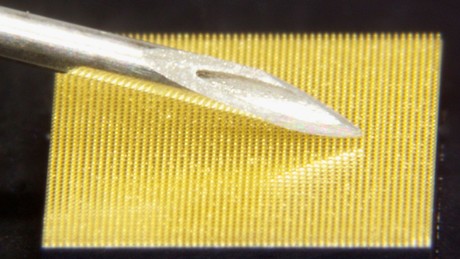Needle-free vaccine delivery wins Young Florey Medal

The winner of the 2016 CSL Young Florey Medal is Queensland rocket scientist Professor Mark Kendall. He has been awarded the biennial prize for inventing a vaccine delivery system that is painless, efficient and eliminates the need for refrigeration.
Dubbed ‘Nanopatch’, the system consists of a 1 cm2 silicon patch with 20,000 microscopic needles that painlessly penetrate the outer layer of skin, delivering a tiny but efficacious dose of dry vaccine to the immune cells that reside just under the outer layer of skin. For 160 years, vaccines have been delivered via needle and syringe, but Professor Kendall’s invention has the potential to transform the way vaccines are delivered in the areas where they are most needed.
Traditional wet vaccines require refrigeration, which can be problematic in remote communities. Another barrier to vaccination is needle phobia, which can affect up to 20% of the population. The research for Nanopatch has been funded by the Bill & Melinda Gates Foundation, Merck and the World Health Organization (WHO). The first field application of Nanopatch is planned for next year with a polio vaccine trial in Cuba.
The road that led to Nanopatch started when Professor Kendall was approached by a team from the University of Oxford to help develop a handheld rocket for vaccine delivery. The result was PowderJect, a device that shoots vaccine particles into the skin at twice the speed of sound. Purchased by Pfizer for $500 million, PowderJect has yet to make it to market.
Professor Kendall was then approached by the Bill & Melinda Gates Foundation, which was looking for a more efficient way to deliver vaccines to remote populations. Realising that the technology behind PowderJect was too complex and expensive for these requirements, Professor Kendall went back to the drawing board and developed Nanopatch under the umbrella of University of Queensland spin-out company Vaxxas, which has begun human trials of the Nanopatch with additional assistance from Merck.

Professor Kendall said: “We’ve got a chance to help stimulate fresh lines of innovation and biotechnology here. There’s 14 million deaths per year due to infectious disease, and so my vision for the Nanopatch is to get more effective vaccines to more people and help save lives.”
Professor Kendall leads the Queensland node of the ARC Centre of Excellence for Convergent Bio-Nano Science & Technology. He is Professor of Biomedical Engineering at the Australian Institute for Bioengineering and Nanotechnology at The University of Queensland and founder, chief technology officer and a director of Vaxxas.
Mini lung organoids could help test new treatments
Scientists have developed a simple method for automated the manufacturing of lung organoids...
Clogged 'drains' in the brain an early sign of Alzheimer’s
'Drains' in the brain, responsible for clearing toxic waste in the organ, tend to get...
World's oldest known RNA extracted from woolly mammoth
The RNA sequences are understood to be the oldest ever recovered, coming from mammoth tissue...





